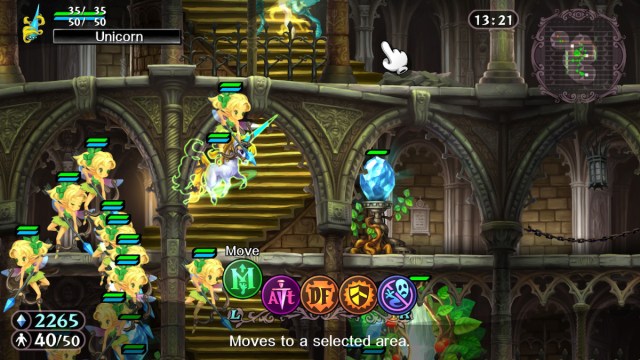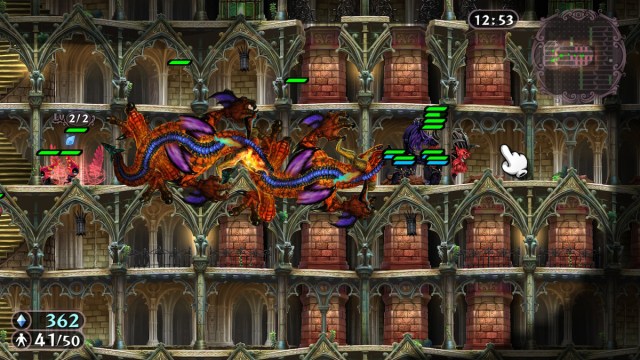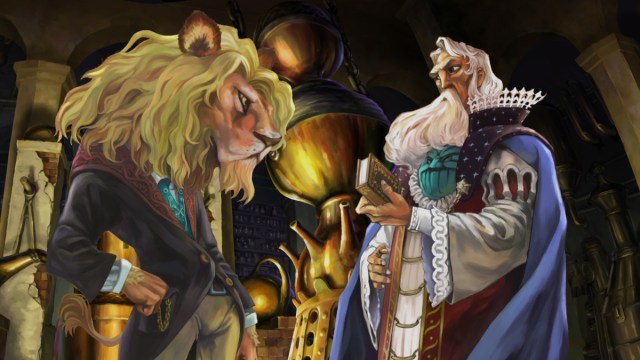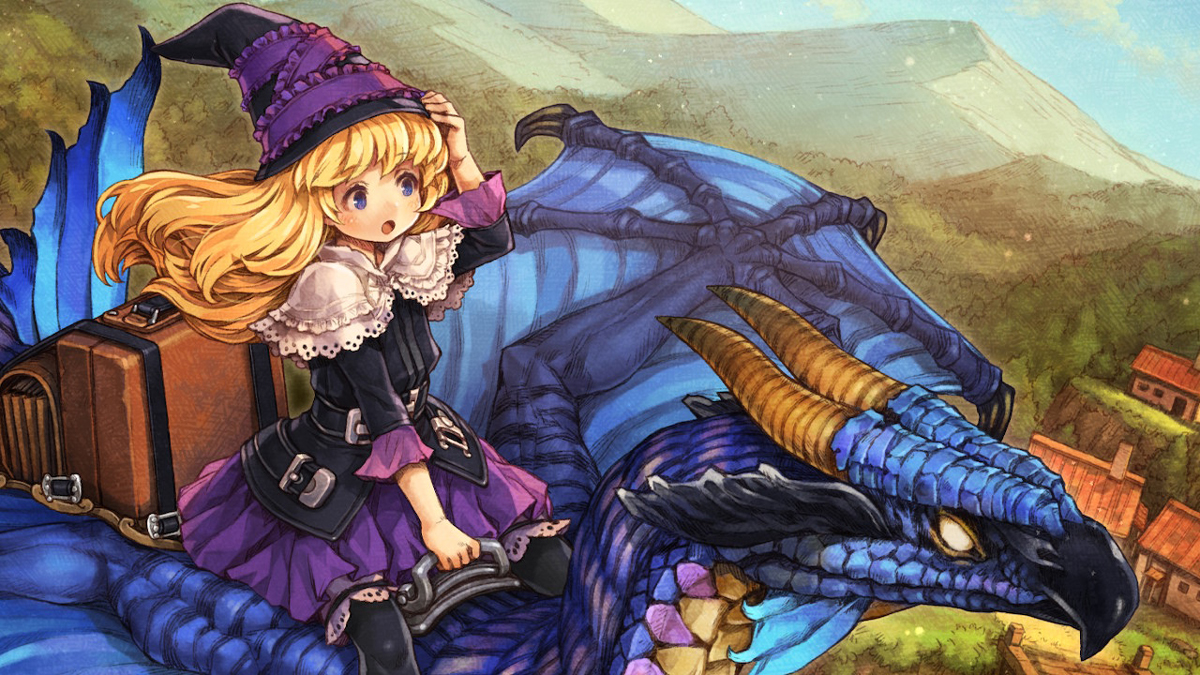If you play just one wizard school game this year…
Since I first played Muramasa: The Demon Blade on the Nintendo Wii, I’ve made it a personal mission of mine to play every Vanillaware title I can on as many platforms as I can. That’s how I ended up owning three copies of Dragon’s Crown, and two copies each of Muramasa, 13 Sentinels, and Odin Sphere: Leifthrasir. I just can’t get enough of their games. With consistently outstanding visuals and excellent gameplay, I have yet to be disappointed by a Vanillaware title. In fact, after playing through GrimGrimoire OnceMore, I’m not sure this developer is capable of making a game I won’t like.

GrimGrimoire OnceMore (PS4, PS5, Switch [reviewed])
Developer: Vanillaware
Publisher: NIS America
Released: April 4, 2023
MSRP: $49.99
Set in a world that is definitely not Harry Potter but also not not Harry Potter, GrimGrimoire OnceMore follows the exploits of Lillet Blan, a new student at Silver Star Tower. It’s the former home of the Archmage, who many years ago was defeated by…sigh…Gammel Dore, who turned the tower into a magic academy. Lillet is there to learn from the great magicians housed inside, but her arrival coincides with a secret plot that seeks to wreak havoc on the school and its teachers. On her fifth day of lessons, tragedy strikes, and Lillet is thrown into a time loop that has her reliving her first five days at the school, giving her a chance to get to the bottom of this murderous mystery.
To keep her teachers and fellow students from meeting an early grave, Lillet will often have to defeat them on the battlefield. In each of GrimGrimoire OnceMore’s chapters, you’ll attempt to lead Lillet to victory in 2D real-time strategy battles. If you’re coming to this straight from 13 Sentinels: Aegis Rim, know that the RTS battles here trend closer to what you’d find in traditional entries in the genre. In battle, Lillet doesn’t do any of the fighting herself. Instead, she uses the various grimoires she’s earned to produce runes from which she’ll summon familiars that do her fighting and resource harvesting. Familiars is the general term for any creature you can summon in battle, including fire-breathing dragons, various types of magical turrets, cats armed with sleep spells, and the most disturbing chimera I think I’ve ever seen.
Grimoires, runes, and familiars fall into four magical categories (Glamour, Necromancy, Sorcery, Alchemy) that are bound to a rock-paper-scissors power dynamic. It didn’t take me too long to get a good understanding of what beats what, but remembering the names of the different familiars you can summon and their special abilities was something of a struggle. In the early chapters, when the types of familiars were limited, I could power my way through every challenge. At around Lillet’s third trip through the loop, that was no longer working for me, and I had slow down and really think about I would go about defeating my enemies.
It has been far too long since I’ve played a proper RTS. It’s probably something I shouldn’t admit, but the last time I earnestly pursued the genre was more than 20 years ago when I got hooked on Star Wars Galactic Battlegrounds on my eMac. My obsession with that game was triggered by my nostalgic memories of playing Command & Conquer: Red Alert with my friends in middle school. This genre used to devour a lot of my after-school time, so I was somewhat surprised at how rusty I was going into GrimGrimoire OnceMore.
The most obvious sign of this is how often I used the new fast-forward feature to speed through each battle. As the combat sequences can go on for quite some time, it’s a godsend of a feature. But it made me pretty careless in those opening hours, and I had to control my use of it if I wanted to see this game through to the end.
Another feature new in this remaster is the skill tree. Each of the different grimoires Lillet learns has its own tree. As you proceed through the story and complete optional side-missions, you earn coins you can spend on these trees to improve your units or give yourself an advantage in battle. In a very player-friendly decision, OnceMore allows you to respec these skill trees at any time, so if you walk into a challenge that is heavy on enemy Alchemy familiars, you can redistribute your coins to the Sorcery skill trees to get the upper hand. Some skills on the trees are locked to the game’s easy and hard modes, the latter of which NIS claims has been tweaked to provide a greater challenge than in the original release.

A less useful new feature, for most of the narrative at least, is Grand Magic. This is—depending on your difficulty—a one-time-use-per-battle piece of magic that can deal a fantastic amount of damage to your enemies or heal your injured familiars. There are four different Grand Magic abilities, but it was rare for me to use anything other than Mana Burst (a massive flaming attack) on the few occasions I pulled the trigger on this ability. Once I started taking the game seriously and got back into the ebb and flow of the RTS genre, I had little use for this get-out-of-jail-free card.
Arguably, the feature most returning players will be interested in here is the HD visuals. GrimGrimoire OnceMore is a stunning game with gorgeous character art, beautiful hand-drawn story segments, and wonderfully creative creature design. Like almost every other Vanillaware title, it’s a fabulous piece of art. If there is one area where the visuals do disappoint, it’s in the backgrounds of the battle sequences. Every battle takes place in the hallways of Silver Star Tower, and it just gets kind of dull after a while seeing the same setting again and again. Each battle map is constructed differently, but they pretty much blend into one another, even when you can see noticeable variations in the scenery.

That is likely my only complaint about this game. Because it’s breathtaking otherwise—particularly on my Switch OLED screen—it controls greatly, and the narrative is well-written, avoiding the expository pitfalls of the time-loop genre. Sure, most of the characters here are off-brand Hogwarts faculty members, but Vanillaware injected enough of its style into these caricatures to make them more than some dollar-store Wizarding World weirdos. The voice cast does a respectable job bringing these characters to life, though some sound far more gifted with the spoken word than others. That, or I just have a thing for actors who chew up the scenery.
The original GrimGrimoire was envisioned as the first in a franchise before poor sales put the kibosh on that idea. I don’t know if Vanillaware and NIS America will be more successful this time around with GrimGrimoire OnceMore, but I hope they are because this game is a top to bottom delight and I would love to see what lies beyond the halls of Silver Star Tower.
[This review is based on a retail build of the game provided by the publisher.]









